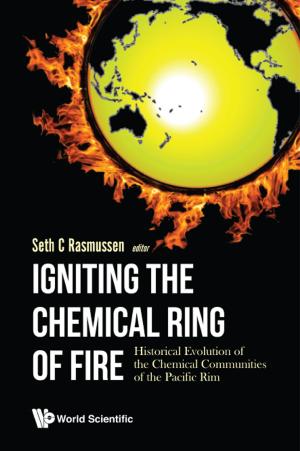The Hope and Vision of J Robert Oppenheimer
Nonfiction, Science & Nature, Science, Physics, General Physics| Author: | Michael A Day | ISBN: | 9789814656764 |
| Publisher: | World Scientific Publishing Company | Publication: | September 15, 2015 |
| Imprint: | WSPC | Language: | English |
| Author: | Michael A Day |
| ISBN: | 9789814656764 |
| Publisher: | World Scientific Publishing Company |
| Publication: | September 15, 2015 |
| Imprint: | WSPC |
| Language: | English |
Incorporating elements from history, science, philosophy and international relations theory, this book takes a fresh look at the life and thought of Robert Oppenheimer.
The author argues that not only are Oppenheimer's ideas important, engaging and relevant, but also more coherent than generally assumed. He makes a convincing case that Oppenheimer has much to say about 21st century issues, and his voice should be brought back into the public forum.
The book recovers and reconstructs what Oppenheimer said and wrote during the 1940s, 50s and 60s (i.e., his hope and vision) with the goal of identifying what might be of general philosophical interest today. It considers not only Oppenheimer's thought, but also his life using philosophical ideas developed by contemporary philosophers.
In addition, to deepen and broaden the discussion and demonstrate the relevance of Oppenheimer's vision for the present, the author analyzes his views using contemporary international relations theory with a special emphasis on nuclear nonproliferation and disarmament. This examination reveals ways in which Oppenheimer's reasoning was prescient of current work being carried out to control, and possibly move beyond, the nuclear revolution.
Contents:
- Introduction
- Oppenheimer's Hope and Vision 1957–1959
- MacLeish, Oppenheimer, and "The Conquest of America"
- Rabi, Oppenheimer, and the Universal Culture of Science
- International Control of Atomic Energy
- Complementarity in Atomic Physics
- Oppenheimer — Philosophical Exploration I
- Oppenheimer — Philosophical Exploration II
- Oppenheimer and International Relations
- Oppenheimer and the Nuclear Revolution
Readership: Historians (especially intellectual and Cold War historians), international relations theorists, physicists, philosophers, and scholars/nuclear policy experts interested in nuclear nonproliferation and disarmament. Members of the general public interested in Oppenheimer as an individual, or subjects like science and culture, or the crisis generated by nuclear weapons, would also find this book valuable.
Key Features:
- The book is scholarly yet accessible and intended to be of broad appeal
- Provides a fresh look at Oppenheimer and his introspections through the lens of philosophy and international relations theory
- Argues for a sympathetic, though not uncritical, understanding of Oppenheimer and his intuition, and furnishes a basis for bringing this intuitiveness back into the public forum
Incorporating elements from history, science, philosophy and international relations theory, this book takes a fresh look at the life and thought of Robert Oppenheimer.
The author argues that not only are Oppenheimer's ideas important, engaging and relevant, but also more coherent than generally assumed. He makes a convincing case that Oppenheimer has much to say about 21st century issues, and his voice should be brought back into the public forum.
The book recovers and reconstructs what Oppenheimer said and wrote during the 1940s, 50s and 60s (i.e., his hope and vision) with the goal of identifying what might be of general philosophical interest today. It considers not only Oppenheimer's thought, but also his life using philosophical ideas developed by contemporary philosophers.
In addition, to deepen and broaden the discussion and demonstrate the relevance of Oppenheimer's vision for the present, the author analyzes his views using contemporary international relations theory with a special emphasis on nuclear nonproliferation and disarmament. This examination reveals ways in which Oppenheimer's reasoning was prescient of current work being carried out to control, and possibly move beyond, the nuclear revolution.
Contents:
- Introduction
- Oppenheimer's Hope and Vision 1957–1959
- MacLeish, Oppenheimer, and "The Conquest of America"
- Rabi, Oppenheimer, and the Universal Culture of Science
- International Control of Atomic Energy
- Complementarity in Atomic Physics
- Oppenheimer — Philosophical Exploration I
- Oppenheimer — Philosophical Exploration II
- Oppenheimer and International Relations
- Oppenheimer and the Nuclear Revolution
Readership: Historians (especially intellectual and Cold War historians), international relations theorists, physicists, philosophers, and scholars/nuclear policy experts interested in nuclear nonproliferation and disarmament. Members of the general public interested in Oppenheimer as an individual, or subjects like science and culture, or the crisis generated by nuclear weapons, would also find this book valuable.
Key Features:
- The book is scholarly yet accessible and intended to be of broad appeal
- Provides a fresh look at Oppenheimer and his introspections through the lens of philosophy and international relations theory
- Argues for a sympathetic, though not uncritical, understanding of Oppenheimer and his intuition, and furnishes a basis for bringing this intuitiveness back into the public forum















